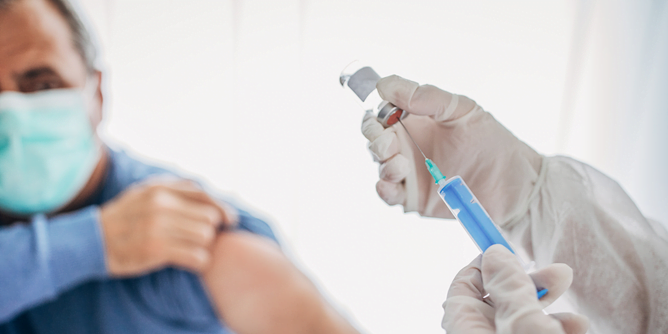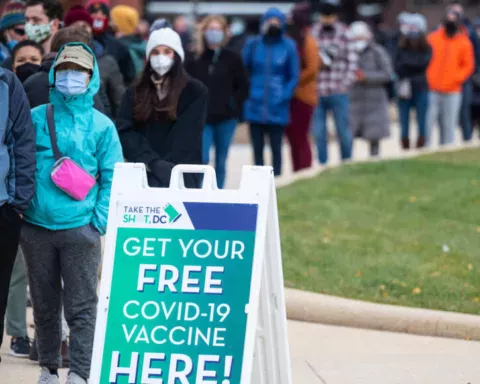A viral trend on TikTok where creators pretend to suffer side effects from an imaginary Covid-19 vaccine has been criticised by medical professionals.
In these ‘point-of-view’ videos, creators play-act as patients who have been given early access to a coronavirus vaccine.
They then invent fictional scenarios whereby they suffer painful side-effects or, in some cases, die.
Insider, which first identified this trend, has found around 30 of these videos.
They say that, collectively, these videos have been viewed over a million times.
In one of the videos, for example, a young man play-acts being given a vaccine which is actually a tracking device.
This scenario is a common conspiracy theory with anti-vaxxers.
Healthcare experts and scientists worry that these light-hearted videos might actually contribute towards an anti-vaccine sentiment and general misinformation.
This is partly because the comments beneath the videos embrace vaccine scepticism.
Dr Noc, an immunologist, told Insider: “The creator of the video could be doing it completely as a joke and could be totally on board with taking a vaccine.”

He continued: “But then it’s very clear that when you look in the comment section, there’s a huge group of people who see that and it’s obvious that they’ve interpreted it as the vaccine is dangerous and that Bill Gates or the government is trying to inject a microchip in you, which is totally false.”
Similarly, Dr Nicole Baldwin – a doctor – said:
I think it plants these seeds of doubt in anybody’s head about what is in a vaccine. And that’s a huge myth that has been perpetuated not only by TikTok but by other social media platforms.
TikTok has begun to remove some of these videos after initially just removing the comments under them.
Half of all parents with small children have been exposed to misinformation about vaccines on social media, according to a new report that finds the most common reason not to vaccinate is the fear of side-effects.
“We need to counteract health misinformation online and via social media,” said Shirley Cramer, the chief executive of the Royal Society for Public Health (RSPH), which published the report.
“We call on the social media giants and the platforms to look at what they could do around this because it is a breeding ground for misleading information and negative messaging. There could be some really negative and dangerous consequences. They need to take some responsibility.”
“Anti-vaxx” groups target the parents of new babies via social media, posting stories claiming babies have died or been harmed by vaccination. A US group called Stop Mandatory Vaccination, run by Larry Cook, was censured by the UK’s advertising watchdog in November over a paid-for Facebook post, after a complaint by the mother of a young baby in the UK.
“Parents, not only can any vaccine given at any age kill your child, but if this unthinkable tragedy does occur, doctors will dismiss it as ‘sudden infant death syndrome’ (Sids),” ran the post, which showed a picture of a baby with his eyes closed with his apparent name and date of birth – and death. It urged readers to join the Facebook group.
In response to the Advertising Standards Authority (ASA), the anti-vaxx group said it “targeted users with an interest in parenting because they intended to cause parents some concern before choosing to vaccinate their children”.
The ASA ruled that the post was misleading advertising and likely to cause fear and distress, particularly to parents seeking factual information about the risks of vaccinating their children.
Cook did not comply with the ruling, the ASA told the Guardian, so it worked with Facebook to have the ad in question removed. But the regulator said its powers were limited.
“There may still be posts appearing on the Larry Cook Facebook page that would, however, fall outside our remit; the ASA can only take action to remove paid-for ads on Larry Cook’s Facebook page that encourage users towards making a financial donation to Larry Cook.”
A Facebook spokesperson said on Wednesday night: “We don’t want misleading content on Facebook and have made significant investments in recent years to stop misinformation from spreading and to promote high-quality journalism and news literacy.
“That said, we always try to strike a balance between allowing free speech and keeping people safe – which is why we don’t prevent people from saying something that is factually incorrect, particularly if they aren’t doing so intentionally.
“However we do take steps to ensure this kind of content is demoted in people’s news feeds to give it less chance of being seen and spread and – ultimately – to discourage those posting it.”
Immunisation levels against common, potentially lethal diseases in Europe have fallen under the influence of sceptics who disseminate their views through social media.
Measles cases in Europe are at a 20-year high and 72 children and vulnerable adults died of it last year. The EU health commissioner, Vytenis Andriukaitis, has warned against the peddling of “fake news” about vaccine safety.
The RSPH report said parents generally supported vaccination in the UK but found “some worrying statistics”. Two in five parents of children under 18 said they were exposed to negative vaccine messages on social media or in online forums “often or sometimes”. That rose to half of parents whose children were under two and 47% whose children were under five.
Only one in 10 parents said they believed what they saw on social media. The report said: “This substantial exposure to negative vaccination messages may influence attitudes to vaccinations over time: repetition of messages is often mistaken for accuracy, a phenomenon known as the illusory truth effect.
“It has been found that even when people know a message is untrue, if it is repeated enough times, they will begin to believe it.”
The research, which included a survey of more than 2,600 parents as well as 2,000 other adults, found that there was a fairly low understanding of vaccines, with more than a quarter (28%) wrongly believing that a person can have too many.
The furore over the MMR (measles, mumps and rubella) vaccine triggered in 1998 by the disgraced gastroenterologist Andrew Wakefield, who claimed it could cause autism, was responsible for a huge drop in take-up, which has largely now recovered in the UK.
However, the research found that one in 10 parents had still not given their child the MMR. Most (70%) said they were afraid of potential side-effects. The discredited autism hypothesis still circulates widely on social media. One in five of all parents, including those who had their child vaccinated, believed the jab was likely to cause side-effects.
Uptake of the HPV (human papilloma virus) vaccine against cervical cancer is good, with more than 83% of girls in school year 9 getting a two-dose course in 2016-17. But it is not as good as uptake of other vaccines. Of the 2,600 parents surveyed, 180 had chosen not to have their child vaccinated and two-thirds of those cited side-effects.
Scare stories have been promoted by anti-vaxx campaigns, including through a YouTube video, claiming the vaccine had caused severe reactions in thousands of girls and hundreds of deaths.
Expert investigations in response to the scare, including a review by the European Medicines Agency, have confirmed that the vaccine is safe.
The Royal Society has also recommended that vaccinations should be available in a wider range of locations, including “pop-up” clinics in the high street, gym and workplaces for adult vaccines such as flu and shingles.
Cramer said social media companies should take responsibility for misinformation about vaccines in the same way that they are doing for mental health. She said: “We think they should clamp down on this spread of fake news and prioritise health information from reputable sources.”
In the RSPH survey, she added: “Four out of five adults agreed with us that social media platforms should take steps to limit fake news regarding vaccination. So the public are calling for this too.”Advertisement
The research was sponsored by MSD, a company that makes vaccines. The RSPH said the firm “did not have editorial input and is not responsible for the content or opinions expressed.”






